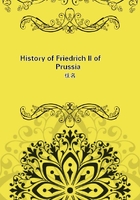
第76章
One of his Daughters he married to the Duke of Liegnitz, a new link in that connection. He left one Boy, George Friedrich;who came under ALCIBIADES, his Cousin of Baireuth's tutelage;and suffered much by that connection, or indeed chiefly by his own conspicuously Protestant turn, to punish which, the Alcibiades connection was taken as a pretext. In riper years, George Friedrich got his calamities brought well under; and lived to do good work, Protestant and other, in the world. To which we may perhaps allude again. The Line of Margraf George the Pious ends in this George Friedrich, who had no children; the Line of Margraf George, and the Elder Culmbach Line altogether (1603), Albert Alcibiades, Casimir's one son, having likewise died without posterity.
"Of the younger Brothers," says my Authority, "some four were in the Church; two of whom rose to be Prelates;--here are the four:--"1. One, Wilhelm by name, was Bishop of Riga, in the remote Prussian outskirts, and became Protestant;--among the first great Prelates who took that heretical course; being favored by circumstances to cast out the 'V. D. (Verbum Diaboli),'
as Philip read it. He is a wise-looking man, with magnificent beard, with something of contemptuous patience in the meditative eyes of him. He had great troubles with his Riga people,--as indeed was a perennial case between their Bishop and them, of whatever creed he might be.
"2. The other Prelate held fast by the Papal Orthodoxy: he had got upon the ladder of promotion towards Magdeburg; hoping to follow his Cousin KUR-MAINZ, the eloquent conciliatory Cardinal, in that part of his pluralities. As he did,--little to his comfort, poor man; having suffered a good deal in the sieges and religious troubles of his Magdeburgers; who ended by ordering him away, having openly declared themselves Protestant, at length. He had to go; and occupy himself complaining, soliciting Aulic-Councils and the like, for therest of his life.
"3. The PROBST of Wurzburg (PROVOST, kind of Head-Canon there);orthodox Papal he too; and often gave his Brother George trouble.
"4. A still more orthodox specimen, the youngest member of the family, who is likewise in orders: Gumbrecht ('Gumbertus, a Canonicus of' Something or other, say the Books); who went early to Rome, and became one of his Holiness Leo Tenth's Chamberlains;--stood the 'Sack of Rome' (Constable de Bourbon's), and was captured there and ransomed;--but died still young (1528).
These three were Catholics, he of Wurzburg a rather virulent one."Catholic also was JOHANNES, a fifth Brother, who followed the soldiering and diplomatic professions, oftenest in Spain;did Government-messages to Diets, and the like, for Karl V.;a high man and well seen of his Kaiser;--he had wedded the young Widow of old King Ferdinand in Spain; which proved, seemingly, a troublous scene for poor Johannes. What we know is, he was appointed Commandant of Valencia; and died there, still little turned of thirty,--by poison it is supposed,--and left his young Widow to marry a third time.
These are the Five minor Brothers, four of them Catholic, sons of old blind Friedrich of Plassenburg; who are not, for their own sake, memorable, but are mentionable for the sake of the three major Brothers. So many orthodox Catholics, while Brother George and others went into the heresies at such a rate! A family much split by religion:--and blind old Friedrich, dim of intellect, knew nothing of it; and the excellent Polish Mother said and thought, we know not what. A divided Time!--Johannes of Valencia, and these Chief Priests, were all men of mark; conspicuous to the able editors of their day: but the only Brother now generally known to mankind is Albert, Hochmeister of the Teutsch Ritterdom; by whom Preussen came into the Family.
Of him we must now speak a little.
Chapter VI.
HOCHMEISTER ALBERT, THIRD NOTABLE SON OF FRIEDRICH.
Albert was born in 1490; George's junior by six years, Casimir's by nine. He too had been meant for the Church; but soon quitted that, other prospects and tendencies opening. He had always loved the ingenuous arts; but the activities too had charms for him.
He early shone in his exercises spiritual and bodily; grew tall above his fellows, expert in arts, especially in arms;--rode with his Father to Kaiser Max's Court; was presented by him, as the light of his eyes, to Kaiser Max; who thought him a very likely young fellow; and bore him in mind, when the Mastership of the Teutsch Ritterdom fell vacant. [Rentsch, pp. 840-863.]
The Teutsch Ritterdom, ever since it got its back broken in that Battle of Tannenberg in 1410, and was driven out of West-Preussen with such ignominious kicks, has been lying bedrid, eating its remaining revenues, or sprawling about in helpless efforts to rise again, which require no notice from us. Hopeless of ever recovering West-Preussen, it had quietly paid its homage to Poland for the Eastern part of that Country; quietly for some couple of generations. But, in the third or fourth generation after Tannenberg, there began to rise murmurs,--in the Holy Roman Empire first of all. "Preussen is a piece of the Reich," said hot, inconsiderate people; "Preussen could not be alienated without consent of the Reich!" To which discourses the afflicted Ritters listened only too gladly; their dull eyes kindling into new false hopes at sound of them. The point was, To choose as Hochmeister some man of German influence, of power and connection in the Country, who might help them to their so-called right. With this view, they chose one and then another of such sort;--and did not find it very hopeful, as we shall see.